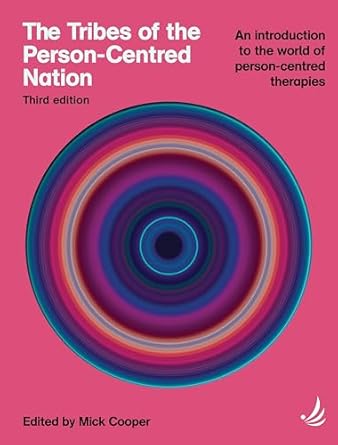The Tribes of the Person-Centred Nation: An Introduction to the World of Person-Centred Therapies

Book Details
- Publisher : PCCS Books
- Published : 2024
- Cover : Paperback
- Pages : 344
- Category :
Individual Psychotherapy - Catalogue No : 98365
- ISBN 13 : 9781915220479
- ISBN 10 : 1915220475
Reviews and Endorsements
This landmark third edition of Tribes offers a cornucopia of person-centred concepts, protocols and practices. Here we have a rich array of contemporary approaches to person-centred therapy that will be valued by practitioners, trainers, supervisors, as well as trainees seeking to understand more about the multiple ways that person-centred therapy has been envisioned and practised. This book is not to be missed. It will become a classic for those seeking to access valuable narratives on the contemporary person-centred therapy landscape. Mick Cooper is an excellent editorial lead, stepping into the shoes of the much-missed Pete Sanders to foster this enormously engaging, multidimensional collection of narratives on traditional and contemporary approaches to person-centred work. As Mick notes in the concluding chapter, each of the tribes has much to contribute to the rich kaleidoscope of person-centred theories and practices.
Lynne Gabriel OBE, Professor of Counselling & Mental Health, York St John University
This text is one of a kind in bringing together for comparison and clarification, the vibrant range of developments within the person-centred nation. It provides clear, expert, descriptions of each ‘tribe’, up to date in theory and research, and brings the practice in each tribe to life with engaging case vignettes that highlight both the differences and the commonalities across these vibrant and evolving approaches. It represents a unique, must-read text for all students on professional trainings as well as for experienced therapists across orientations.
Peter Pearce, Director of Clinical Training, Metanoia Institute
Carl Rogers’ influence on the development of psychotherapy was wide-ranging. In this much awaited third edition, Mick Cooper has brought together a remarkable range of authors and proponents of the different therapies that have roots in Rogers’ work. Cooper challenges us to consider the boundaries of person-centredness, and the commonalities and differences of these approaches. It is essential reading for students and anyone interested in the wider legacy of Rogers and the health of humanistic therapies today.
Professor Stephen Joseph, University of Nottingham, and author of Think Like a Therapist
This is a magnificent book presenting a range of distinctive work and important developments within the person-centred nation. Mick Cooper has done a magnificent job in bringing together this stimulating, rich resource that is both scholarly and accessible with its theoretical insights, case examples of therapist key skills, suggested reading and further sources for exploration. It will be of enormous value to those in training and seasoned person-centred therapist alike. I also recommend it to therapists of all orientations as it is full of inspiration for contemporary therapeutic practice.
Divine Charura, Professor of Counselling Psychology, York St John University
A number of branches have grown from the roots of person-centred hypotheses and philosophy. In this accessible text, each chapter author lays out a rationale for why their ‘tribe’ belongs in the person-centred family. For students seeking clarity and for practitioners looking to locate themselves within the branches, this is essential reading.
Janet Tolan, counselling, supervisor and co-editor of People Not Pathology
This book is an important resource for readers keen to understand, explore and debate the similarities, tensions and differences that exist in the various branches of the person-centred nation. It is a potent demonstration of Margaret Warner’s assertion that ‘Person-centred therapy should not be considered a single form of psychotherapy, but rather a cluster of therapies sharing some broad values’.
Colin Lago, independent therapist and writer, inspired by person-centred thinking and practice for more than 50 years
Cooper’s new edition of Sander’s work wonderfully elucidates the theoretical/clinical clusters we gravitate to as practitioners. It beautifully highlights the historical and contemporary developments within our vibrant kaleidoscope of practice groupings. It is significant reading for both students and qualified therapists alike.
Christine Brown, Founding partner, LC&CTA

